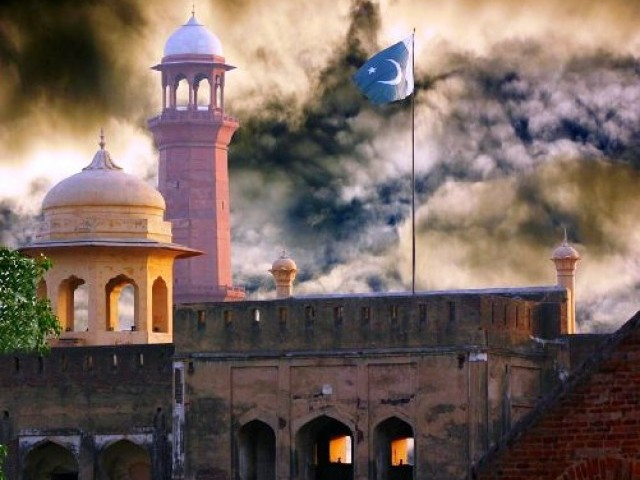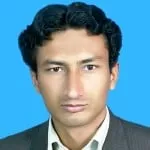These people are not ready to agree with the historical background presented by Chaudhry Mohammad Ali in his book The Emergence of Pakistan.
While presenting the logic behind the differences between Hindus and Muslims which led to the severance of India Ch. Mohammad Ali writes:
"They have mixed but never fused: they have coexisted but have never become one. Hindu and Muslim families that have lived in the same neighbourhood for generations can be distinguished at a glance from one another. The clothes, the food, the household utensils, the layout of homes, the manner of speech, the words of salutation, the postures, the gestures, everything about them will be different and will immediately point to their origin".
But when I put above quoted text before Baaba Ghaamru, an uneducated but wise man in the eleventh decade of his life in my village, he laughs at me and the author.
He says,
"Jeja toon jhalla tay jeja tehnda Mohammad Ali"
(You are mad like your Mohammad Ali)
Giving his short but terse argument he says that if every kind of beast and bird live in the jungle why can't humans live in a united country? His reply silenced me. Baaba Ghaamru says:
"I have my childhood friends from Hindu and Sikh communities and we lived in peace and harmony. We were not aware what was being woven in Karachi, Lahore, Delhi, Mumbai and Kolkata. We came to know about 'Wand' (Partition) only on that day of Sawan (mid July to mid August) when village was echoed with the news of "Exodus of Hindus and Sikhs".
My grandmother (Naani Amaan) Khursheed Begum who is around 100-years-old also offers a tearful and pathetic tale:
"At the time of partition my eldest daughter was six-months-old. When she was born, a Hindu friend of mine by the name of Videyaan gifted her two murkis (ear-rings, I fail to find proper English of myriad words of Punjabi as English seems sterile before Punjabi)"
"The Dhakku village contained Hindus, Sikhs and Muslims as its inhabitants and we lived in peace and harmony. At the occasion of Eidul Azah we slaughtered cows out of Hindus' sight not because of fear but out of reverence. In Ramazan, Hindus and Sikhs did not eat any thing during fast in front of Muslims. Not because they feared us rather they respected our religious rites."
This revelation quakes my nerves.
There are thousands of such people who still feel pain whenever they think about the events caused by partition. The major dilemma is that they could not meet their families after partition due to souring of relations or poor financial conditions. Gaamru and Khursheed were real representatives of India during the freedom movement years but they had nothing to do with that movement.
Poignant memories of bloody partition still haunt those who saw the gory days of August and September in 1947.
Our poets and writers created masterpieces on the massacre of 1947. Faiz's Subh-e-Aazadi, Faraz's Sarhaden, Afzal Sahir's Pakistan dee war, Shiv Kumar Batalvi's Dudh daa Qattal and work by Sadat Hassan Manto are the most powerful rejoinders to that logic presented in the history text books being taught at the schools of India and Pakistan.
Shiv Kumar (the bloody partition forced him to leave his native Pind, Bara Pind Lotian in tehsil Shakargarh to move to Batala situated at the other side of border now) opens his timeless poem Dudh daa Qattal (The Murder of Milk) as:
"Menu tay yaad aey aj vee tay tenu yaad howay ga,
Jaddon dohaan ney rall kay aapni maan daa qattal kitaa see,
Os daa lahu jaddaan kuteyaan kawaan ney pitaa see,
Aapna naan aseen saaray hee pind wich bhand litaa see".
Here is a poor translation, with a humble apology to the immortal Shiv:
"I still remember and you would have also remembered,
When both together we murdered our mother,
When dogs and crows drank her blood,
We slaughtered our own name in the entire town".
But now what's done can't be undone
India managed itself after severance of the sub-continent, but Pakistan didn't.
Our very founders ignored the Quaid's historic speech delivered to the Constituent Assembly on August 11, 1947 in which he yearned for a secular Pakistan.
Today we are caught in the menace of bloody fanaticism, unbridled corruption, utter apathy and indifference towards our cultural assets and artists. Is the sole factor of this mess is that we carved out a truth out of lies on August 14, 1947?
The young and daring poet Afzal Sahir gives the right answer in his poem, “Pakistan dee War” (The war of Pakistan) when he says:
“Assan jooto jooti khaid kay hik such banraaeya"
(We carved a truth out of the game of lies)
The need of the hour is that both countries particularly Pakistan should act swiftly and boldly to materialise the dream of Quaid-e-Azam and Gandhi who thought that both countries would live as brothers not as blood-thirsty vultures. The people Pakistan want to travel Amritsar as they travel Rawalpindi and their other cities. Indian people also wish so.
But our rulers are still in a deep slumber.
[poll id="83"]



COMMENTS
Comments are moderated and generally will be posted if they are on-topic and not abusive.
For more information, please see our Comments FAQ